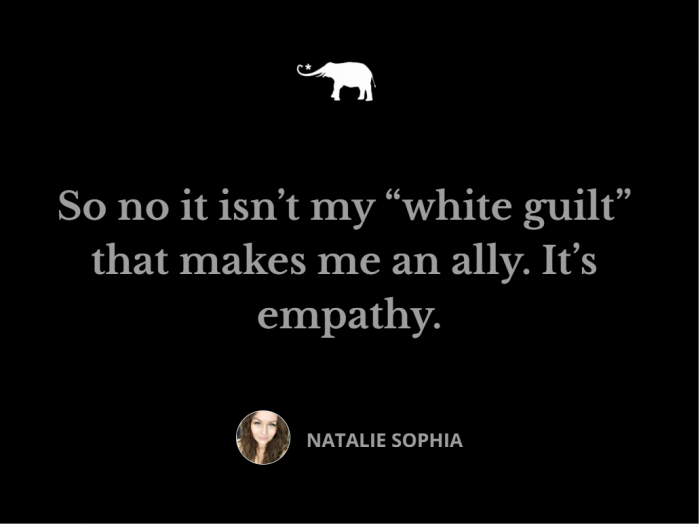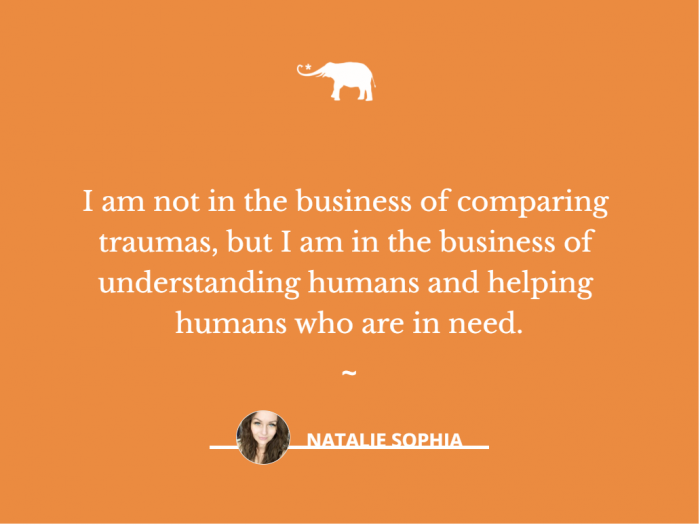Maybe we should start by clearing things up.
Guilt implies that I have done something wrong and I can make amends to change my behavior and fix it.
Have I unconsciously contributed to systemic racism? Absolutely! Is it something I am proud of? Nope. Do I understand that now that I know better I can do better? Yes. Does that mean I stop learning how to do better? No, I will forever be a student of this world and therefore consistently learning about how I can leave this world better than I found it.
Guilt is not what drives my behaviors to see that people of color have equal rights. Guilt isn’t what leaves a feeling in the pit of my stomach that I cannot name or the lump in my throat when I think about the fact that there is an entire group of people longing to feel heard. There is only one thing that drives my behavior and that one thing is shame. Since guilt is something I have already clarified, let me now clarify shame.
Shame or toxic shame is the underlying belief that you, as a person are wrong. Your very existence is somehow wrong. Shame is not something you can change your behaviors around and feel better about yourself. Shame implies that you are inherently bad simply for existing. There is no behavior change that will help you go back to your confident sense of self, because you have no basis of a healthy sense of self.
If you were raised in a toxic household or raised by narcissistic types, then you too will know shame just as intimately as me. I can speak only from my experience with shame, as it is something I am still healing within myself and I feel it best to start here on the microscopic level before taking it to a macroscopic level.
~
Best way to to keep your core pelvic and org@sm muscles strong and resilient? Here’s the coveted apparatus that makes this possible >>
~
Toxic shame is formed in the brain as we are developing from childhood into adulthood. In fact during your earliest years, in order to have a strong sense of self, you need to have proper mirroring and validation from your caregivers. Mirroring is something akin to a child being proud of something, going to show the parent, and the parent being proud of the child’s work. Maybe they ask the child how it was created or what the child’s process was, but it serves to mirror the child’s own feelings (i.e. pride) and therefore validates the young child’s feelings thereby providing them with a stronger sense of self. They feel good and they feel right because they felt proud and so did their caregiver.
On the other hand, if a caregiver does not mirror or validate the young child—the child begins a self-narrative that they are bad or wrong. They lose trust in themselves and continue to look to the adults around them to give them a sense of belonging or of being valued. When the outside world is not able to provide them with enough or any validation it only drives home the message that they are at their core wrong, leaving them feeling as though they do not matter and with an overall weakened sense of self. This core wound of shame can get carried well into adulthood and beyond if it is never identified, addressed, and healed.
I have been living toxic shame for most of my life. I have gone through life with the perspective that I am inherently wrong simply for breathing. I too have looked to the outside world to provide me with some sort of sense of belonging, only to be shut down again and again. I have sought countless ways to be better, to do better, to be more loveable, accepted, acceptable, and worthy. Yes, I can see this and name it, and I understand it and I am even taking steps to heal it, but that doesn’t mean it’s easy. I can also understand not being valid simply by being a woman in this world, but I can’t imagine how people of color feel as well.
To me, society has only deemed to provide people of color with a deeply rooted core wound of toxic shame. And here we go macroscopic with this perspective. In my view, it would seem that people of color have been conditioned to believe that they are inherently bad or wrong simply for the color of their skin. Collectively, the government, television, magazines, and movies have shared the message that people of color are not valid. They have not been living in a world that offers the unconditional support that is needed nor the recognition and validation that is their birthright.
So no it isn’t my “white guilt” that makes me an ally. It’s empathy.
I am empathetic because I know firsthand how it feels to be invisible and I would have loved to have someone stand up for me. I would have loved to know that my experiences mattered and that my life was important. I would have loved to know that the things that I do and the things that I create are just as special as my peers’. Please know it is not my intent to turn this into a pity party about my experiences. I am not in the business of comparing traumas, but I am in the business of understanding humans and helping humans who are in need.
I stand by the statement: all lives can’t matter until black lives matter because people of color have experienced a world vastly different than white people. Generation after generation, people of color have been subliminally receiving the message that they are wrong simply for being alive. Now, maybe you don’t understand that and you won’t be able to relate to this and on the one hand, I feel happy for you that you know what it feels like to be accepted as you are. That said, maybe this article can offer you a different perspective than the one you’ve had about the importance of equality.
I truly believe that as I heal my shame—I help others heal theirs as well. If you are a person of color, I have not forgotten about you. I am still on your side and I am still in your corner. And if you are a Karen accusing me of hopping on the latest trends, I pray for your happiness. Because only unhappy people judge others and right now we need more love than ever.
Love is the only thing that will heal all this shame.
~
Ready to join?
Hey, thanks so much for reading! Elephant offers 1 article every month for free.
If you want more, grab a subscription for unlimited reads for $5/year (normally, it's $108/year, and the discount ends soon).
And clearly you appreciate mindfulness with a sense of humor and integrity! Why not join the Elephant community, become an Elephriend?
Your investment will help Elephant Journal invest in our editors and writers who promote your values to create the change you want to see in your world!
Already have an account? Log in.
Ready to join?
Hey, thanks so much for reading! Elephant offers 1 article every month for free.
If you want more, grab a subscription for unlimited reads for $5/year (normally, it's $108/year, and the discount ends soon).
And clearly you appreciate mindfulness with a sense of humor and integrity! Why not join the Elephant community, become an Elephriend?
Your investment will help Elephant Journal invest in our editors and writers who promote your values to create the change you want to see in your world!
Already have an account? Log in.
Ready to join?
Hey, thanks so much for reading! Elephant offers 1 article every month for free.
If you want more, grab a subscription for unlimited reads for $5/year (normally, it's $108/year, and the discount ends soon).
And clearly you appreciate mindfulness with a sense of humor and integrity! Why not join the Elephant community, become an Elephriend?
Your investment will help Elephant Journal invest in our editors and writers who promote your values to create the change you want to see in your world!
Already have an account? Log in.

 Share on bsky
Share on bsky








Read 0 comments and reply